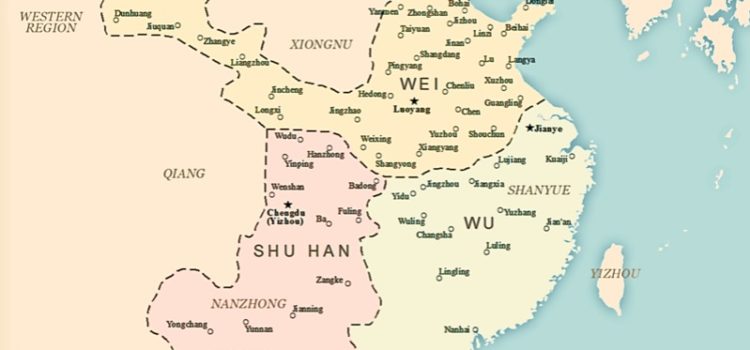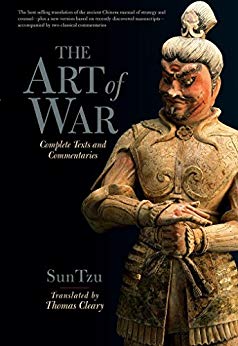

This article is an excerpt from the Shortform summary of "The Art of War" by Sun Tzu. Shortform has the world's best summaries of books you should be reading.
Like this article? Sign up for a free trial here .
What was the Three Kingdoms Period? What can its wars teach us about the value of location, alliance, and loyalty in battle?
The Three Kingdoms Period was the era in which three kingdoms ruled China: the Wei, Shu, and Wu. This period began in 220 AD and ended in 280 AD with the rise of the Jin Dynasty.
We’ll cover what the Three Kingdoms Period can teach us about the importance of location, alliances, and loyalty.
Three Kingdoms Period: Taking Advantage of Location and Alliances
After the fall of the Han dynasty, three kingdoms—the Wu, Shu, and Wei—battled during what was known as the Three Kingdoms Era (190 to 265 C.E.). The general of Shu joined forces with the Wei, becoming a military governor of what was called “New City.” However, soon after, he defected to the Wu, again switching his allegiance.
The Wei general was advised by his commanders to send scouts to observe the actions of the Shu and Wu before reacting. But the Wei general wanted to take advantage of the uncertainty of loyalty that would necessarily follow such a flip-flopping of allegiance. The Wei general sent a force to New City, traveling day and night. Meanwhile, the defector assured his commanders that the Wei was too far away. He said his troops would be fortified and ready by the time the Wei learned of his actions and mobilized.
When the Wei arrived eight days later, surprising everyone with their swiftness, they easily pushed through the defector’s ill-prepared army and forced a surrender.
Alliances During the Three Kingdoms Period
During the Three Kingdoms Period, the Shu army surrounded a faction of the Wei military. Cao Cao, a Wei general, wanted to relocate the rest of the Wei’s capital away from enemy lines for safety. But a minister of Wei advised against such an action, stating that it exuded weakness. Instead, he said they should form an alliance with the state of Wu. The Shu and Wu were considered to be allies, but the minister knew this was only a surface appearance. He assumed the Wu leadership would begrudge the Shu gains.
Cao Cao agreed and sent an emissary to create an alliance with Wu, who was tasked with attacking the Shu from the back. The Wu were successful, and the Shu retreated from its position surrounding the Wei army.
Lessons From the Three Kingdoms Period
What can we learn from the Three Kingdoms Period? What can the era teach us about the importance of alliances, location, and loyalty?
Alliance
Alliance was important for the survival of the Wei, Shu, and Wu during the Three Kingdoms Period. Follow these rules for strong alliances.
- Form alliances to increase your strength to a point where fighting would be ill-advised for your opponent.
- Form alliances with the enemy’s allies to disrupt the enemy’s power.
- Create strong alliances on intersecting ground.
- If a leader does not form alliances, establish authority, and refrain from anger and violence, they will be alone, ineffective, and vulnerable. If a leader can create this situation in their enemy, the enemy will be unable to defend against you.
Distance
The various empires had to understand the terrain and take advantage of distances during the Three Kingdoms Period.
The terrain relates to the “lay of the land,” meaning the geographical and physical factors of certain types of terrain. These factors make a parcel of land either advantageous or disadvantageous for advancement or battle. Factors to consider include distance to be traveled, the layout of the terrain and accompanying effort required to cross it, the size of the land, and safety and dangers encompassed in the geography.
Reduce the use of supplies. You should avoid lengthy battles, which deplete food, money, and energy. When traveling great distances for battle, feeding off the enemy’s abandoned stores ensures your stores are maintained. Only use weapons when all other strategies for victory have been exhausted.
Location, Location, Location
When the path to battle is long, resources are used and troops tire. This makes either you or your opponent weakened and vulnerable to attack. Therefore, use the distance traveled for battle to your advantage, as did the Wei during the Three Kingdoms Period.
- When your journey to battle is long, double the speed of travel to arrive sooner than expected. Your opponent will be relaxed as they wait and unprepared for your early arrival.
- When your opponent’s journey to battle is short, force them to take circuitous routes to lengthen their journey. Forcing the enemy to defend multiple points or cherished locations disrupts their straight path.
When you travel far for battle, you are in enemy territory. The terrain is unfamiliar. Until you know the advantages and disadvantages of the land, you cannot prepare a strategy. Use local guides to assist in understanding the environment.
- The IChing states, “Chasing deer without a guide only takes you into the bush.”
To gain advantage in a foreign place, you must use deception to manipulate the enemy.
- Feign your condition to fool enemies.
- Divide and combine forces to exhibit false formations while you are actually formless. False formations confuse and mislead the enemy.
Act only when you have an advantage. When no advantage is seen, create a strong defense and hold your ground in a way that is not seen. This was an important strategy during the Three Kingdoms Period.
- Be immovable as a mountain and as secret as fire, destroying every trace of where you have tread.
- When you have gained advantages in the war, divide your troops to defend what was gained so you can expand your territory.
Loyalty
Leaders during the Three Kingdoms Period followed something called “the way.”
The Way describes the harmonious relationship between the government and civilian populace. When the government treats its people with kindness and concern, the people are more apt to support government agendas and be loyal.
- This loyalty translates to support of military strategy and the willingness of those tapped to participate in the conflict.
Having the largest force does not equate to winning the battle. If you have a smaller force, hold your ground, gather the troops you have, keep an eye on the enemy, and prepare a defense.
Even if you have the largest force, if you rely on strength alone, fail to strategize, and take your enemy’s forces for granted, you will be defeated.
If your troops are punished without first gaining their trust and loyalty, they will withdraw emotionally and will be hard to mobilize.
———End of Preview———

Like what you just read? Read the rest of the world's best summary of "The Art of War" at Shortform . Learn the book's critical concepts in 20 minutes or less .
Here's what you'll find in our full The Art of War summary :
- How to mislead your enemies to win the war
- Classic examples from Chinese history to illustrate Sun Tzu's strategies
- How to use spies to gather information and defeat your opponents






